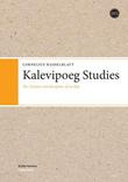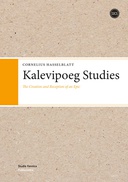Explore

Kalevipoeg Studies: The Creation and Reception of an Epic
The poem Kalevipoeg, over 19,000 lines in length, was composed by FriedrichReinhold Kreutzwald (1803–1882) on the basis on folklore material. Itwas published in an Estonian-German bilingual edition in six instalmentsbetween 1857 and 1861; it went on to become the Estonian national epic.This first English-language monograph on the Kalevipoeg sheds light onvarious aspects of the emergence, creation and reception of the text.The first chapter sketches the objectives of the book and gives a shortsummary of the contents of the twenty tales of the epic, while the secondchapter treats the significance of the epic against the cultural background ofnineteenth-century Estonia.
The third chapter scrutinizes the emergence of the text in moredetail and, in its second part, takes a closer look at the many intertextualconnections and the traces the epic material has left in Estonian literatureup to the present time. The fourth chapter is a detailed case study of onedebated passage of the fifteenth tale.
The fifth and the six chapters deal with the German reception of the epic,which partly took place earlier than the reception in Estonia. In the fifthchapter, the first reviews and an early treatise by the German scholar WilhelmSchott (1863) are discussed. The sixth chapter presents the new genre of‘rewritings’ of the epic – texts which cannot be labelled as translations butare rather new creations on the basis of Kreutzwald’s text.
In the seventh chapter several versions of these retellings and adaptationsare compared in order to show the stability of some core material conveyedby various authors. A concluding chapter stresses the significance of foreignreception in the canonization process of the Kalevipoeg. At the end, acomprehensive bibliography and an index are added."
This book is part of the Studia Fennica Folkloristica series.
This book is included in DOAB.
Why read this book? Have your say.
You must be logged in to comment.

